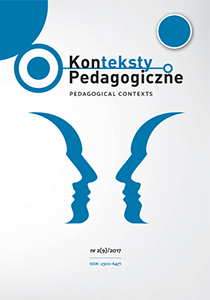Abstract
The investigation of the essentials of ESP as a trend in teaching foreign languages for professional communication has been suggested. The recent data on needs analysis of the Ukrainian students (the educational institutions mainly located in Western Ukraine) have been presented. The necessity to pay attention to the peculiarities of teaching a foreign language to nonlinguistic students at higher educational institutions has been substantiated. The approaches to and models of ESP course design have been compared and most efficient ideas have been suggested. On the basis of the research, the aspects have been defined according to which curricula and learning materials should be constructed, according to the defined models of teaching.
References
Бим, И.Л. (1991). Подход к проблемеупражнений с позициииерархиицелей и задач.// Общая методика обученияиностраннымязыкам: Хрестоматия/Сост. Леонтьев А.А., Москва: Рус. яз.
Guerid, F. & Mami, N.A. (2016). Approaches to course design comparison before implementing an ESP course for finance managers of Arcelor Mittal Algeria Company. English for Specific Purposes World, 17(51), http://www.espworld.info [accessed: 12.03.2017].
Harper, D. (1986). ESP for the University. Oxford: Pergamon Press.
Hutchinson, T. & Walters, A. (1987). English for specific purposes. A learning-centred approach. Cambridge: Cambridge University Press.
Kalantzis, M. & Cope, B. (2006). The Learning by Design Guide. Melbourne: Common Ground.
Mackay, R. & Mountford, A. (1978). English for specific purposes. London: Longman.
Marenzi, I. & Kantz, D. (2013). ESP course design – a multiliteracies approach. In: Reshaping learning: transforming education through the fusion of learning and techno-logy. Proceedings of the 13th IEEE International Conference on Advanced Learning Technologies (ICALT 2013). Beijing, China, https://www.researchgate.net/publication/259745755_ESP_Course_Design__A_Multiliteracies_Approach [accessed: 12.03.2017].
Панова, Л.С., Андрійко І.Ф., Тезікова С.В. та ін. (2010). Методика навчання іноземних мов у загальноосвітніх навчальних закладах: підручник/– ВЦ «Академія», Kyiv.
Robinson, P. (1991). ESP Today: a practioner’s guide. UK: Prentice Hall International.
In accordance with the recommendation of the Ministry of Science and Higher Education, which aims to counteract the practice of “ghostwriting” and “guest authorship,” all authors submitting their text for publication should attach an author’s statement which declares the contribution of each of the authors to the article. The printed and signed statement should be delivered by mail or other means to editor-in-chief Joanna Skibska or sent in the form of a scan to the following e-mail address: redakcja@kontekstypedagogczne.pl. The authors will not receive remuneration for publishing their papers. The editors reserve the right to make minor editorial changes to the articles which will not affect the substance of the article. We encourage all authors to prepare their articles in accordance with the guidelines for manuscript preparation. Download pdf file.
Authors transfer all copyrights and grant the journal the right of first publication with the work simultaneously licensed under a Creative Commons Attribution License that allows others to share the work with acknowledgement of the work's authorship and initial publication in this journal. All authors agree to the publishing of their email addresses, affiliations and short bio statements with their articles during the submission process.

